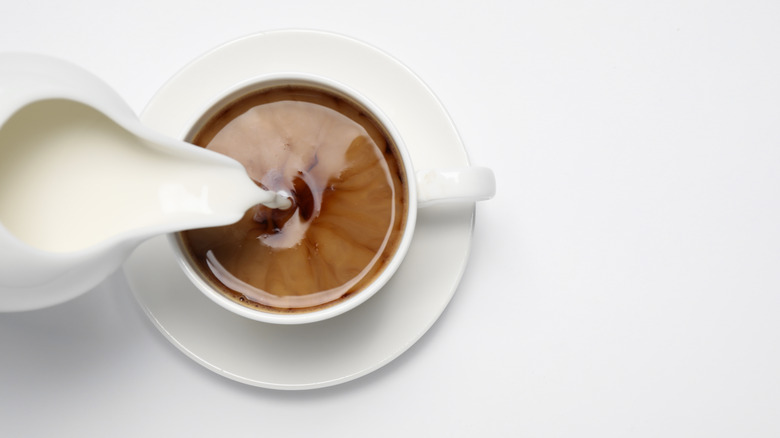What It Means When Half-And-Half Doesn't Properly Dissolve In Coffee
Pouring half-and-half into your coffee should be the easiest, and probably the happiest, part of your morning. The other parts of making coffee are getting more complicated, with its own glossary (via Essence) — and you wonder if you got the right small batch, artisanal, shade-grown roast, or if you should be grinding your beans fresh. Now you've got your hot coffee in front of you, and all it needs is a little splash of your favorite creamer to lift you and get your day started right.
That's why it can be so frustrating as you stare at your homemade cup through bleary eyes and watch as your half-and-half curdles or separates, leaving you with an unappealing collection of lumps instead of a smooth, creamy pick-me-up. Why have the coffee gods cursed you at the last moment? Did you make some mistake while brewing that could have avoided this catastrophe? Unfortunately, this is something you need to take care of before you even pull your coffee out of the cupboard.
Half-and-half that does not dissolve in coffee has spoiled
We're sorry to say that if your cream is curdling in your coffee, it is probably past its prime. You may have done your due diligence and checked that best-by date, but according to Reader's Digest, it's just a guideline, and half-and-half can start to spoil before that. Well and Good says that milk products that were not curdled before you poured them into your coffee are probably still safe to drink, but you probably won't want to.
The reason older half-and-half will fleck or curdle when it hits hot coffee has to do with how aging dairy affects the pH balance. According to Rosso Coffee Roasters, as dairy ages, it will produce lactic acid, lowering the pH level. Add in the fact that coffee is an acidic beverage, and the combination can push your dairy over the line to the point where it curdles, the same way it would if you left it on the counter for too long (via U.S. Dairy). Science can help you make a better cup of coffee, but unfortunately, it can also wreak havoc on your milk.

